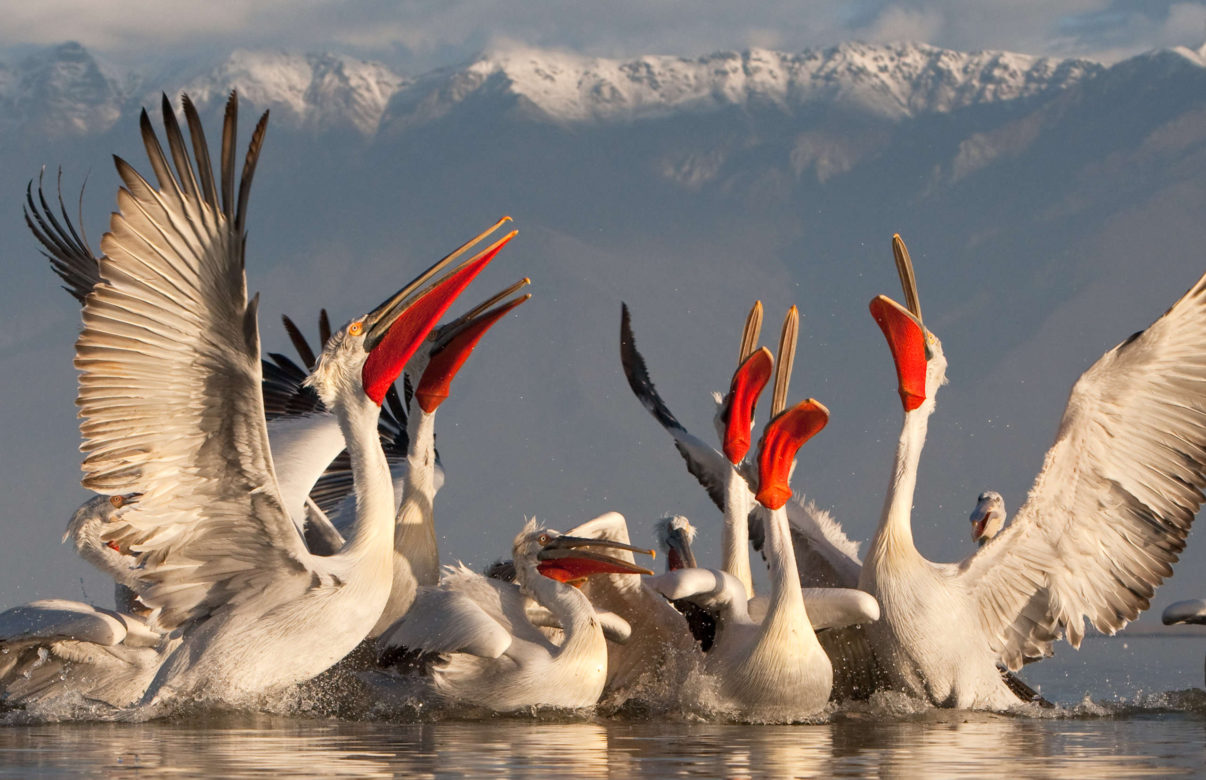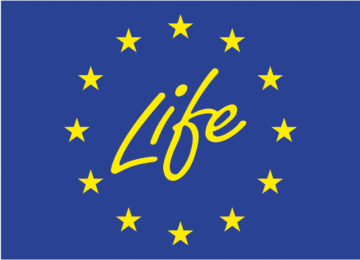Coordinated by Rewilding Europe, the “Pelican Way of LIFE” project formally kicked off in Bucharest on November 20. Its pan-European, multi-partner efforts will hopefully boost populations of this important and iconic bird.

Endangered icon
With a wingspan of almost three metres and weighing in at over 10 kg, the Dalmatian pelican is one of the most impressive breeding birds in Europe. The sight of a group of these massive fish eaters taking to the air is an awe-inspiring avian spectacle.
Despite its iconic status, the Dalmatian pelican is extremely vulnerable across its entire geographic range, and is classified as “Near Threatened” on the IUCN Red List. In order to breed it needs access to still, fish-filled waters undisturbed by human activity, with extensive flooded and shallow water areas.
 The main causes of population decline are loss of such habitat, as well as destruction of breeding colonies by fishermen, illegal hunting and collisions with electric power lines. Reducing these threats and improving breeding habitat is the aim of the new, five-year “Pelican Way of LIFE” project, which officially launched at a kick-off meeting in Bucharest on November 20.
The main causes of population decline are loss of such habitat, as well as destruction of breeding colonies by fishermen, illegal hunting and collisions with electric power lines. Reducing these threats and improving breeding habitat is the aim of the new, five-year “Pelican Way of LIFE” project, which officially launched at a kick-off meeting in Bucharest on November 20.
Pan-European project
As part of the European Commission-funded LIFE programme, efforts will focus on conservation of the species along the Black-Sea Mediterranean Flyway, which is home to around 50% of the global population. In addition to the LIFE programme, the comeback of the Dalmatian pelican is also supported by the Arcadia Fund, the UK based charitable trust of Lisbet Rausing and Peter Baldwin that supports charities and scholarly institutions that preserve cultural heritage and the environment.
The Mediterranean-Black Sea Flyway is one of three Palaearctic-African flyways connecting Europe with Africa. Collectively, these constitute the world’s largest bird migration system. “In the Danube Delta rewilding area and across its range, the Dalmatian pelican is both an iconic species and an important indicator of ecological health,” explains Deli Saavedra, Rewilding Europe’s Rewilding Area Coordinator. “Through its varied actions the LIFE Pelicans project aims to contribute to a stabilisation of populations in some areas and an increase in others.”
Delivering impact
Specific project actions will include efforts to:
- reduce direct mortality from collisions with power lines
- enhance nesting conditions through habitat improvement action and patrols
- increase stakeholder awareness of and engagement in Dalmatian pelican conservation (through initiatives such as youth awareness programmes and nature-based tourism promotion)
- monitor the overall impact of the project
The tagging of 25 Dalmatian pelicans with satellite transmitters will provide invaluable information that can guide future conservation measures.
A survey will be carried out in partnership with regional electricity distribution companies in Romania, Bulgaria and Greece to assess the most dangerous power lines for pelicans, and identify those that are potentially suitable for the installation of diverters. These simple devices are attached to power lines to make them stand out to birds in flight, so that they can avoid them.
Breeding and roosting sites for Dalmatian pelicans will be improved at key sites along the flyway through the construction of artificial floating platforms. These will help to reduce the impact of water level changes (resulting from factors such as climate change), which can often render the birds’ traditional, reed-and-grass nesting sites unusable.
Joined up thinking
The Bucharest event was attended by all project partners. Rewilding Europe will acts as the coordinating beneficiary, with other partners comprising Rewilding Ukraine, Rewilding Danube Delta, the Hellenic Ornithological Society (Greece), Persina Nature Park Directorate (Bulgaria), the Bulgarian Society for the Protection of Birds (Bulgaria) and the Romanian Ornithological Society (Romania).
The Dalmatian pelican is dispersive in Europe, largely based on feeding opportunities. The LIFE Pelicans project will take account of this, with project work to be carried out in 27 Special Protection Areas (SPAs) in Romania, Bulgaria and Greece, as well as in the Ukrainian Danube Delta, with supporting actions in Turkey and other Balkan countries. The project will provide a significant contribution to the mission of the Natura 2000 network, which as the world’s largest network of protected areas aims to ensure the long-term survival of Europe’s most valuable and threatened species and habitats.
In the Danube Delta, which is shared by Romania, Moldova and Ukraine, Dalmatian pelicans frequently move around between sites. Project actions planned in the Ukrainian part of the delta should therefore prove beneficial to birds across the entire area.
“One of the objectives of the project in the Danube Delta is to create new breeding colonies on the Ukrainian side,” explains Deli Saavedra. “This will decrease the global threat to the species. Similarly, supporting conservation in other countries along the flyway will be beneficial for populations breeding farther south and west.”
